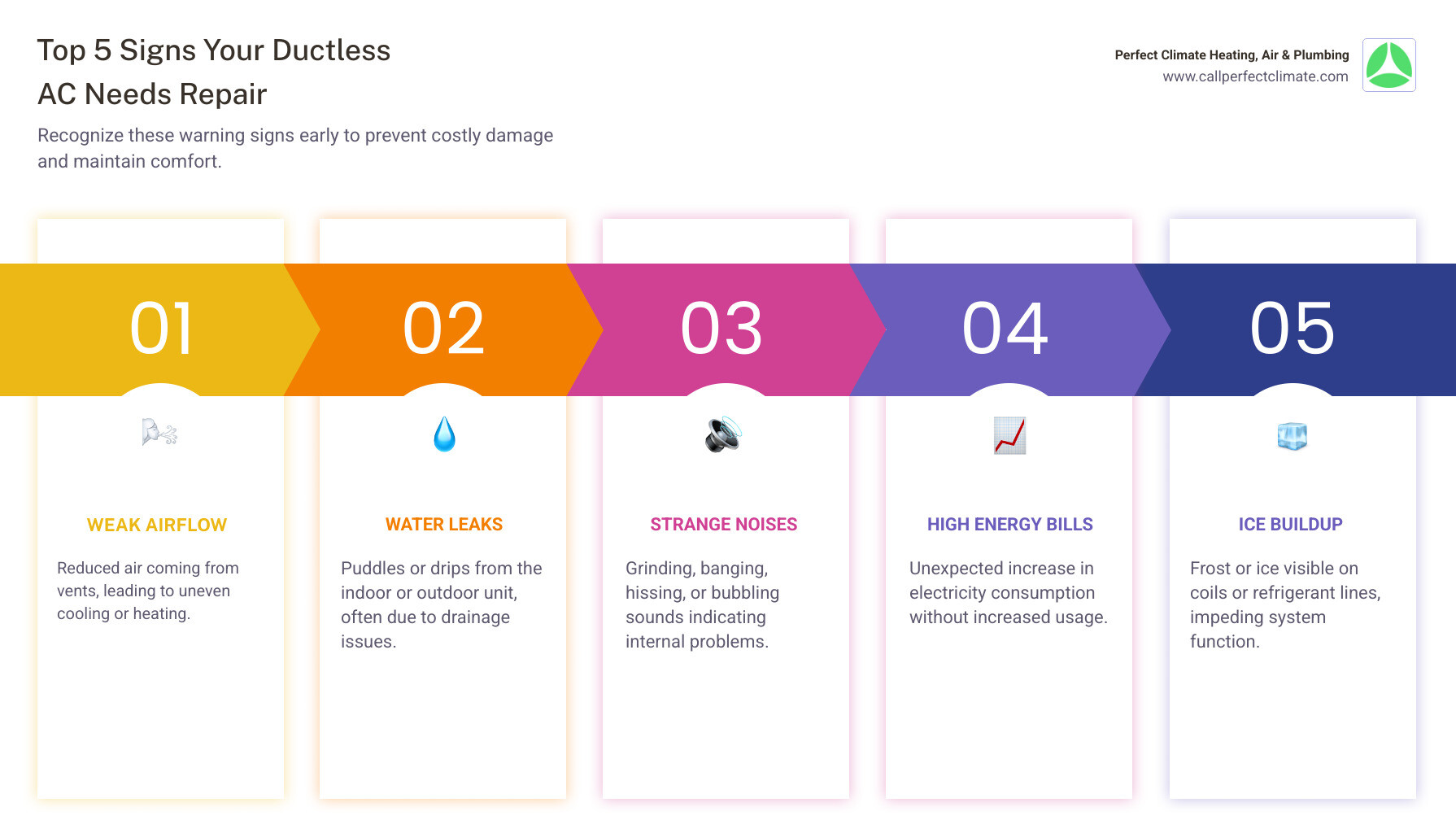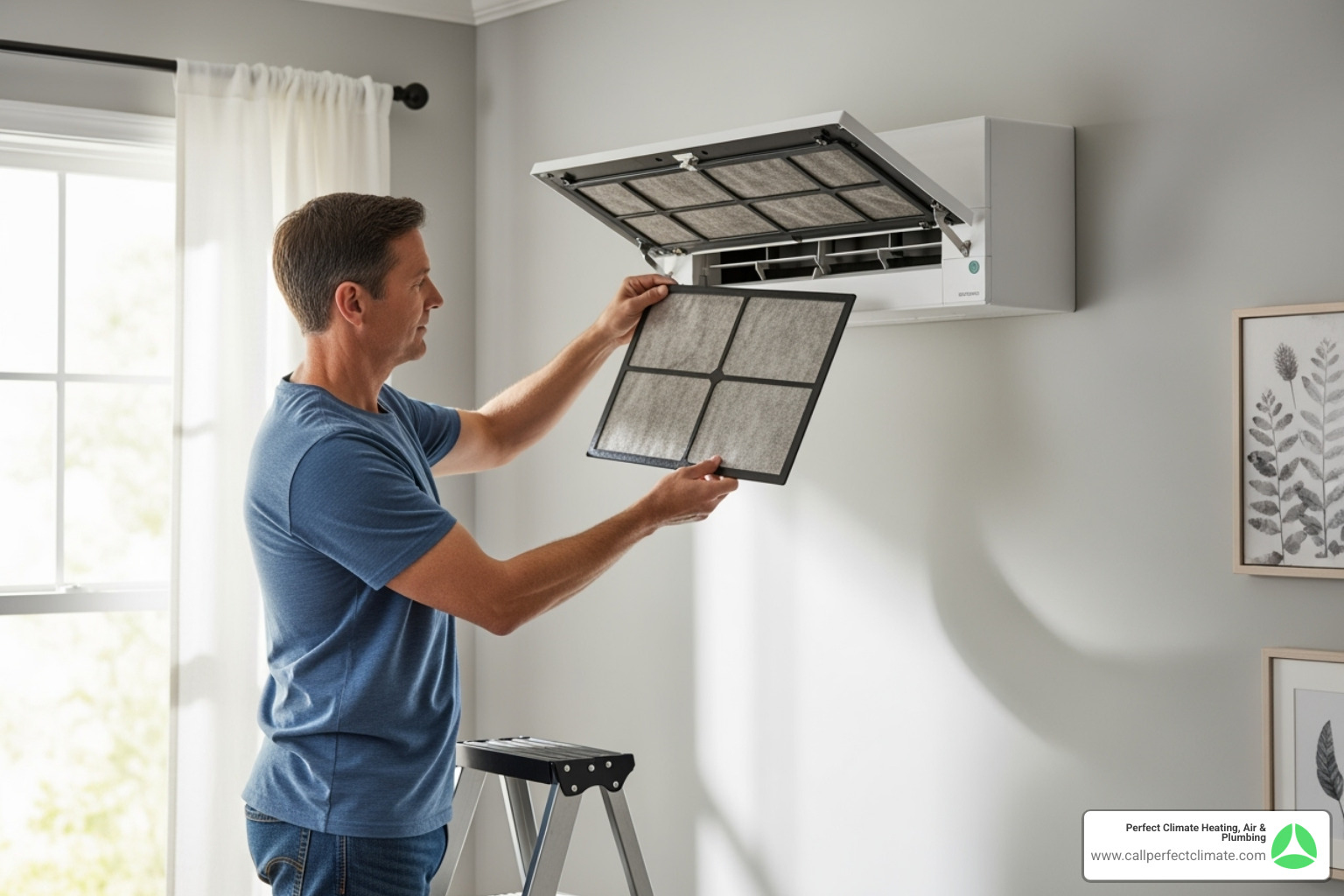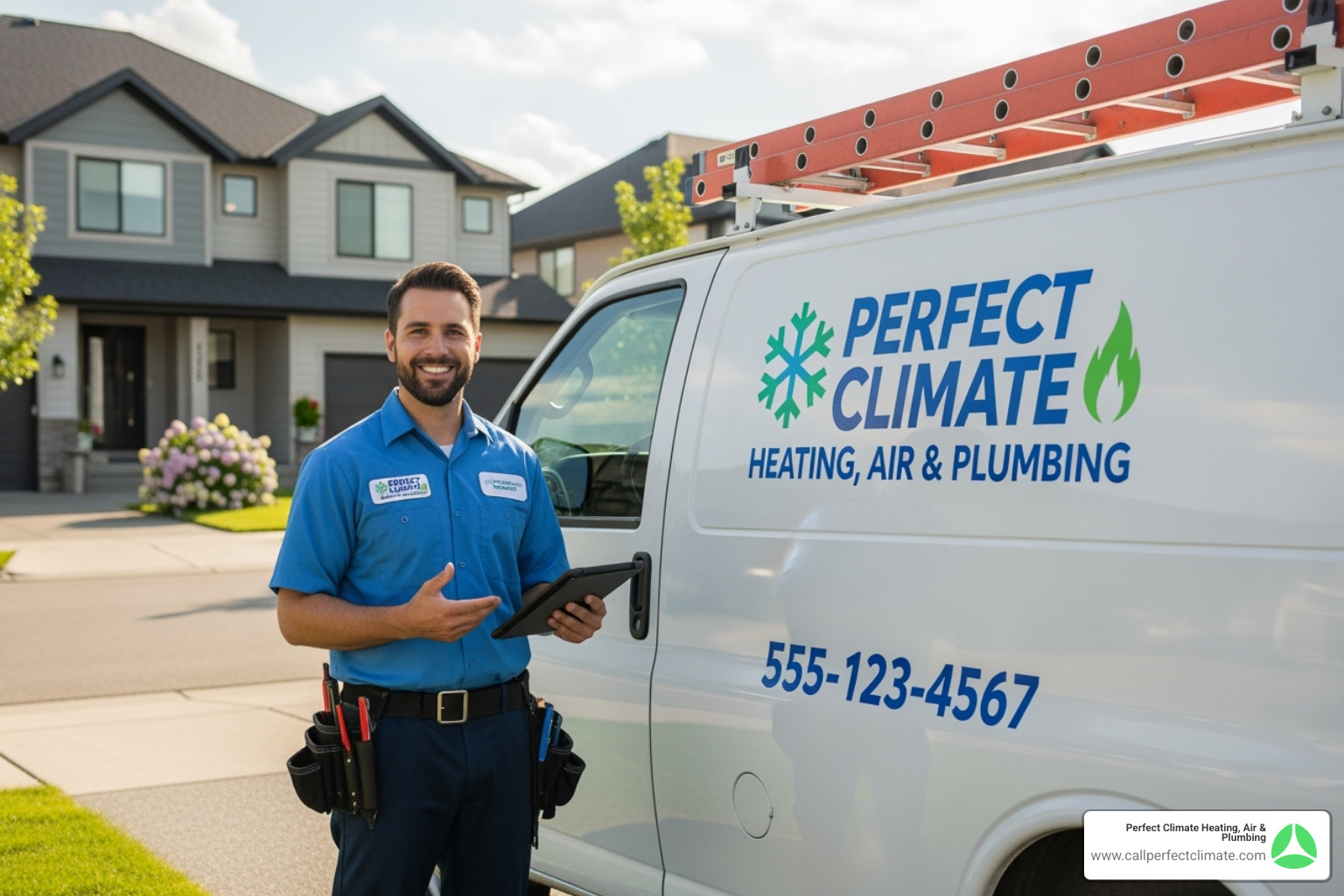When Your Mini-Split System Needs Help
Ductless AC repair is often needed when homeowners notice reduced cooling, strange noises, water leaks, or higher energy bills from their mini-split systems. Here’s what you need to know:
Common Signs You Need Ductless AC Repair:
- Weak airflow or poor cooling performance
- Water leaking from indoor or outdoor units
- Strange noises like grinding, banging, or hissing sounds
- Higher energy bills without increased usage
- Ice buildup on coils or refrigerant lines
- Short cycling (frequent on/off operation)
- Unpleasant odors from the system
Your ductless mini-split system has been working great all summer. Then suddenly, your home doesn’t feel as cool as it used to, even though the unit keeps running. Sound familiar?
Mini-split systems are known for their energy efficiency and quiet operation, often lasting up to 20 years with proper care. But like any HVAC equipment, they can develop problems that need attention.
The key question isn’t just whether your system needs repair – it’s whether repair makes more sense than replacement. This depends on factors like the system’s age, repair costs, and current efficiency levels.
Some issues are simple fixes you can handle yourself, like replacing air filters or checking thermostat settings. Others require professional help, especially anything involving refrigerant, electrical components, or internal parts.
Common Signs Your Ductless AC Needs Attention
Recognizing the early warning signs your mini-split sends can save you from bigger headaches later. Here’s what to look out for:
Weak airflow is often the first sign homeowners notice. The air from your unit feels less powerful, and the room isn’t cooling properly. This could be a simple clogged filter or a more serious issue like low refrigerant levels.
When your energy bills start climbing without a change in usage, your system is likely working overtime to compensate for an underlying problem, consuming more electricity.
Strange noises from a system designed for quiet operation are never normal. Grinding, banging, or hissing sounds often point to specific mechanical or refrigerant issues we’ll explore below.
Water leaking from your indoor or outdoor unit indicates a problem, usually a blocked drain line or a component that needs attention.
Unpleasant odors can indicate mold or mildew growth inside the unit due to trapped moisture, creating an unhealthy environment for your system and your family.
Short cycling—when the unit turns on and off repeatedly without completing a full cooling cycle—wastes energy and puts stress on components.
Finally, ice buildup on your coils or refrigerant lines is a clear sign of a problem, often related to airflow or refrigerant levels that need immediate attention to prevent further damage.
For more insights on recognizing these warning signs, check out our guide on Recognizing Heat Pump Repair Signs.
Why is My Mini-Split Leaking Water?
As your mini-split cools, it removes humidity from the air. Leaks happen when the path for this collected water gets blocked. The most common culprits are:
A clogged drain line is the top cause. Over time, algae and debris can block the tube that carries water away, causing it to back up and overflow from your indoor unit.
Your air filter plays a key role. A dirty, clogged filter restricts airflow, causing the evaporator coil to get too cold and freeze. When the ice melts, the excess water can overwhelm the drain system.
Frozen evaporator coils, whether from dirty filters or low refrigerant, create a similar issue. When they thaw, they can dump more water than the drain system can handle.
Sometimes the problem is a damaged drain pan or a loose connection in the drain line, preventing water from draining correctly.
For a comprehensive look at these issues and their solutions, visit our Ductless AC Issues and Solutions page.
What Do Strange Noises Mean?
While a soft hum is normal, any new or loud noises from your mini-split deserve attention. These sounds can help diagnose the problem:
Grinding sounds usually mean trouble with motor bearings in your indoor or outdoor unit, often worsened by dirt buildup creating friction.
Banging or clanging suggests a loose part, like a fan blade or motor mount, which can cause more damage if ignored.
Hissing or bubbling is a classic sign of a refrigerant leak. This is not just a ductless AC repair issue but also an efficiency and environmental concern.
Continuous clicking (beyond normal startup sounds) often points to electrical issues like a faulty relay or thermostat problem. Screeching or squealing typically means fan motor components need attention.
Acting quickly on these sounds can prevent minor issues from becoming major damage. Our Top Problems with Heat Pumps guide covers many issues that also affect ductless systems.
DIY Troubleshooting vs. Professional Ductless AC Repair
When your ductless mini-split starts giving you trouble, your first instinct might be to roll up your sleeves and figure it out yourself. And honestly? That’s not a bad place to start. There are several simple checks you can do that might just solve the problem without needing to call for ductless AC repair.
Let’s start with the basics. Check your thermostat settings first – it sounds almost too simple, but you’d be surprised how often the issue is just the wrong mode or temperature setting. While you’re at it, replace those remote batteries. A weak battery can cause all sorts of communication problems between your remote and the unit.
Here’s the big one that fixes a lot of problems: clean or replace your air filters. This is probably the most important thing you can do for your mini-split. Dirty filters are behind so many issues – weak airflow, poor cooling, even those water leaks we talked about earlier. Most indoor units make it pretty easy to pop out the filter for a quick wash or replacement.
Don’t forget to check your circuit breaker too. Sometimes a tripped breaker is all that’s standing between you and cool comfort. And take a walk around both your indoor and outdoor units to clear any obstructions. That outdoor unit needs room to breathe, and your indoor unit can’t do its job if furniture or curtains are blocking the vents.
If you’ve tried these steps and you’re still having issues, our Mini Split Heat Pump Troubleshooting guide can walk you through a few more things to check. But there’s definitely a point where DIY troubleshooting hits its limits, and that’s when it’s time to call in the professionals.
When You Absolutely Need a Professional
Some problems are just too complex, too dangerous, or too specialized for a DIY approach. When it comes to ductless AC repair, knowing when to step back and call a professional can save you from bigger headaches down the road.
Electrical issues are a definite no-go for most homeowners. If your unit won’t power on or you suspect wiring problems, leave it to the experts. Working with electricity without proper training is genuinely dangerous – not worth the risk.
Refrigerant leaks require special handling too. That hissing sound or ice buildup you noticed? It could mean refrigerant is escaping, and this stuff requires special tools and certification to handle safely. Only licensed technicians should detect leaks, repair them, and recharge your system with the right type and amount of refrigerant.
Compressor problems are another area where professional expertise is essential. The compressor is basically the heart of your AC system. If you’re hearing loud grinding noises from the outdoor unit, or your system is blowing warm air when it should be cooling, the compressor might be the culprit. These repairs are complex and usually expensive.
Then there are all those complex internal parts like control boards, fan motors, and reversing valves. These components require specialized knowledge to diagnose and replace properly. Attempting repairs on these parts without proper training often leads to more damage and higher repair bills.
The bottom line? Any situation involving hazardous refrigerants, high-voltage electrical components, or heavy equipment presents safety risks that only trained professionals should handle. Professional service isn’t just about getting the job done right – it’s about keeping you and your family safe.
What to Expect from a Professional Ductless AC Repair Service
When you call Perfect Climate Heating, Air & Plumbing for ductless AC repair, we believe you should know exactly what to expect from start to finish. Our goal is to make the whole process as smooth and transparent as possible.
We start with thorough system diagnostics. Our technicians don’t just look at the obvious problem – we check your entire system. That means examining electrical connections, testing refrigerant levels, inspecting fan motors and coils, checking drain lines, and testing control boards. We use professional-grade diagnostic tools to pinpoint exactly what’s going on.
Once we’ve identified the issue, we’ll give you upfront pricing with a clear explanation of what’s wrong and what it’ll take to fix it. No surprises, no hidden fees – just honest pricing before we start any work. We believe you should never be caught off guard by unexpected costs.
Our trucks are stocked with common parts, so we can often complete repairs on the spot. Every repair comes with a repair warranty because we stand behind our work. And when we’re dealing with refrigerant handling or electrical components, we follow strict safety protocols to protect both our technicians and your home.
You can expect us to handle typical services like leak detection using specialized equipment, refrigerant recharge with the exact amount your system needs, fan motor repair when airflow issues arise, control board replacement if the electronic controls are malfunctioning, and condensate drain cleaning to prevent those pesky water leaks. We’ll also clean coils, replace faulty sensors, and calibrate thermostats as needed.
Our team has years of experience with ductless systems, and we won’t consider the job done until you’re completely satisfied. Plus, we’ll usually share some tips on maintaining your system to help prevent future problems. After all, the best repair is the one you never need.
Repair or Replace? Making the Smart Choice
When your ductless mini-split starts giving you trouble, you’re faced with that age-old homeowner dilemma: fix it or replace it? It’s like deciding whether to keep nursing an old car along or finally trading it in for something newer and more reliable.
The decision often comes down to more than just the immediate repair bill. You need to think about the bigger picture – your comfort, your wallet, and your peace of mind over the next several years.
System age is probably the most important factor to consider. While ductless systems can soldier on for up to 20 years, they’re typically at their best during their first 10-12 years. If your unit is getting up there in age and facing a major repair, you might be looking at a situation where you fix one thing today, only to have something else break next month.
Think about how often you’ve been calling for ductless AC repair lately. If your system has become a regular patient – needing frequent visits from HVAC technicians for different issues – it’s probably trying to tell you something. Those repair bills can add up quickly, and before you know it, you’ve spent more patching up an old system than you would have on a shiny new one.
The cost comparison is crucial here. When a major repair like a compressor replacement starts approaching half the cost of a new unit, replacement often makes more sense financially. You’re not just buying a repair – you’re investing in years of reliable service, improved efficiency, and the latest technology.
Speaking of efficiency, this is where newer systems really shine. Today’s high-SEER mini-splits are incredibly efficient compared to units from even just a few years ago. A new system might cost more upfront, but those monthly energy savings can really add up over time. Ductless AC units offer efficient cooling with minimal energy loss, and the newest models take this even further.
Don’t forget to consider your future needs too. Maybe your family has grown, or you’re planning to finish that basement. A replacement gives you the perfect opportunity to upgrade to a multi-zone system or choose a unit that’s better sized for your actual needs. For detailed guidance on making this important decision, check out our Guide to Ductless HVAC Replacement.
| Factor | Repair | Replace |
|---|---|---|
| System Age | Ideal for newer units (under 10-12 years) | Recommended for older units (over 10-12 years) |
| Cost | Lower upfront cost for minor issues | Higher upfront cost, but long-term savings possible |
| Efficiency | Maintains current efficiency | Significantly improved energy efficiency (SEER) |
| Lifespan | Extends current unit’s life, but not indefinitely | Provides full new lifespan (15-20 years) |
| Warranty | Repair may have limited warranty | New unit comes with full manufacturer warranty |
| Technology | No upgrade to features | Access to latest features, quieter operation, smart controls |
| Peace of Mind | Temporary relief, recurring issues possible | Fresh start, fewer breakdowns, reliable performance |
| Energy Bills | No significant change | Potentially lower monthly energy bills |
Key Factors in the Ductless AC Repair vs. Replacement Decision
Let’s dig deeper into what really matters when you’re weighing repair against replacement for your ductless system.
The cost of the repair is obviously a big deal, but it’s not just about the number on the invoice. Minor fixes like cleaning a clogged drain or replacing a sensor are usually no-brainers – they’re relatively inexpensive and can give you years more service, especially if your system is still relatively young.
But when you’re looking at major component failures, the math changes quickly. Major issues like compressor problems, significant refrigerant leaks, or multiple failing parts often signal that your system is reaching the end of its useful life. These aren’t just expensive to fix – they’re often warning signs that other components will start failing soon too.
The nature of the problem tells its own story. Minor vs. major repairs represent very different scenarios. A dirty filter or faulty sensor is an isolated incident. A failing compressor or major refrigerant leak suggests your system has been through the wringer and might not have much fight left in it.
System efficiency becomes more important every year as energy costs rise. Even if you can repair your older unit, it’s probably not cooling as efficiently as it did when it was new. Modern ductless systems are remarkably more efficient than older models, and that efficiency translates directly into lower monthly bills.
Finally, there’s the reality of age and reliability. A 12-year-old system that needs a major repair is statistically likely to need another significant repair within the next couple of years. Sometimes it makes more sense to bite the bullet and invest in a new system before your old one leaves you sweating through a heat wave.
The good news? You don’t have to make this decision alone. Our team can walk you through the numbers and help you understand what makes the most sense for your specific situation. And if you’re leaning toward replacement, our Ductless HVAC Replacement Timeline can help you plan the process from start to finish.
Frequently Asked Questions about Mini-Split Repair
When your ductless system acts up, you have questions. Here are answers to the most common concerns we hear about ductless AC repair.
How much does it cost to fix a ductless AC?
The cost of ductless AC repair depends entirely on the problem. Similar to car repairs, the final price is influenced by the specific issue, the parts needed, and the complexity of the work.
Minor repairs, like cleaning a clogged drain line or replacing a sensor, are typically inexpensive and involve a service call and basic labor.
Major repairs, such as addressing refrigerant leaks, compressor problems, or other key component failures, represent a more significant investment. A refrigerant leak, for example, requires detecting the source, fixing it, and then recharging the system.
Most HVAC companies charge a diagnostic fee to cover the technician’s time and expertise in troubleshooting the issue. After a thorough inspection, we provide a clear, upfront estimate before any work begins, so you know exactly what to expect.
How long do ductless mini-splits last?
Ductless mini-split systems are built to last, with a typical lifespan of 15 to 20 years. Some well-maintained units can last even longer.
The key to maximizing this lifespan is regular maintenance. Just as regular check-ups are vital for your health, annual tune-ups are crucial for your HVAC system.
How repairs affect longevity depends on the issue. Minor, isolated repairs can help maintain your system’s health. However, frequent or major repairs often signal that the system is nearing the end of its useful life.
Compared to traditional central air conditioners, ductless units often have a longer lifespan due to their simpler, duct-free design.
How does regular maintenance prevent repairs?
Regular maintenance is the best investment you can make to prevent costly repairs and ensure your system’s longevity. An ounce of prevention is truly worth a pound of cure.
During an annual tune-up, our technicians perform a comprehensive inspection. We clean coils, check refrigerant levels, tighten electrical connections, and ensure every component is running at peak efficiency. This proactive approach catches minor issues before they escalate into major, expensive problems.
As a homeowner, your most important task is regularly cleaning or replacing your filters. A dirty filter forces your system to work harder, putting unnecessary strain on components like the fan motor and compressor.
Keeping the coils clean is also crucial. Dirty coils hinder your system’s ability to transfer heat, leading to poor performance, higher energy bills, and increased wear on parts.
Consistent maintenance prevents small issues from snowballing. A cleared drain line prevents water damage and mold, while a tightened electrical connection can prevent component failure. Our Benefits of Ductless HVAC Tune Up in Mount Carmel page explains more about why this is such a smart investment.
Your Local Ductless AC Experts in Haubstadt, IN
We hope this guide has shed some light on ductless AC repair and helped you understand when to roll up your sleeves for a DIY fix, and when to call in the professionals. To recap the key signs, remember to watch out for weak airflow, strange noises, water leaks, increased energy bills, short cycling, ice buildup, and unpleasant odors. These are your system’s ways of telling you it needs attention.
The importance of timely action cannot be stressed enough. Addressing problems quickly can prevent them from escalating into more serious and costly issues. A small leak ignored can lead to a damaged compressor, and a dirty filter left unchecked can cause your unit to freeze up.
That’s why proactive maintenance is so vital. Regular tune-ups and diligent filter cleaning are your best defense against unexpected breakdowns, ensuring your ductless system operates efficiently and reliably for years to come.
When it comes to expert ductless AC repair, installation, and maintenance in Haubstadt, IN, and the surrounding areas, we at Perfect Climate Heating, Air & Plumbing are your trusted local experts. We’ve been dedicated to serving our community with the highest quality products and professional service, ensuring your home stays comfortable year-round. Our local expertise extends to Haubstadt IN, Evansville IN, Princeton IN, Newburgh IN, and throughout Indiana, providing comprehensive services for all your HVAC and plumbing needs. We specialize in advanced technologies and offer comprehensive energy audits and preventive maintenance programs to keep your home running smoothly.
So, whether you’re experiencing a minor hiccup or a major malfunction with your mini-split, don’t hesitate to reach out. We’re here to provide reliable, efficient, and warm service, ensuring your indoor climate is always perfect.
For expert mini-split heat pump services in Patoka, IN, or any of our service areas, contact us today. We’re ready to help! Contact us for expert mini-split heat pump services in Patoka, IN.



